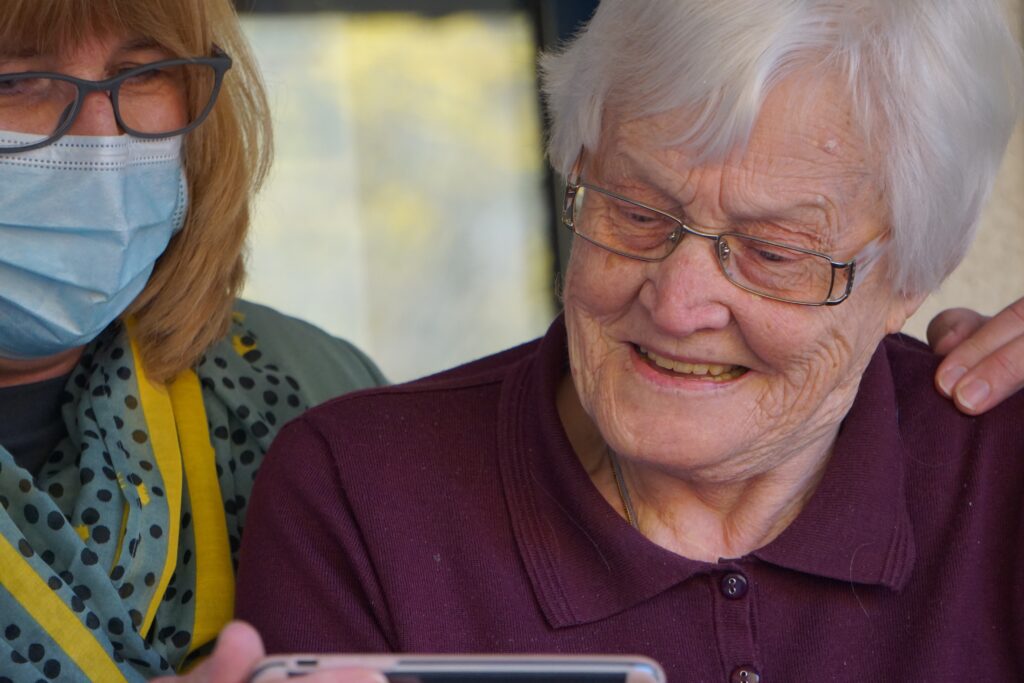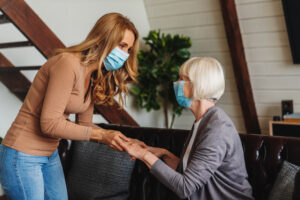Caring for an elderly loved one is often a full-time job, and there’s no shame in needing a little extra help. Older adults who are living independently and staying in their home often require a level of care that requires a professional home health aide. Non-medical home health aides can provide this level of care at a more affordable rate, taking some of the burden off of family members who often have additional responsibilities to attend to. Home caregivers can assist with daily tasks like dressing, bathing, and meal preparation. This will allow family caregivers to have some peace of mind as they head to work or tackle other tasks.
If you’re feeling burnt out or anxious caring for your elderly loved one, you are not alone. Hiring a home health aide may be the right choice for you. Before you make that decision, however, it’s important to understand what this type of care entails.
What Is a Non-Medical Home Health Aide?
Non-medical home health aides exist to help the elderly and others with non-medical services, like bathing, feeding, dressing, and medication management.
Non-medical elderly caregivers can also monitor their clients’ vital signs and physical well-being. They don’t, however, handle more complicated health services. They can, however, collaborate with medical professionals in order to monitor and maintain wellness.
Prolonged life expectancy has led to an increase in demand for elder care in recent years. According to AARP, people who are 65 or older have a 70 percent chance of requiring living assistance as they age. Unfortunately, not all of those people have the means or desire to move to an assisted-living facility.

Instead, many elderly people and their families are opting for home health aides. These types of caregivers receive state-specified training and are tasked with helping their elderly charges with everyday functions. Some of the basic duties home health aides cover are cooking, shopping, and overseeing basic hygiene.
Non-medical home health aides for the elderly can also monitor their clients’ vital signs and physical well-being. They don’t, however, handle more complicated health services. They can, however, collaborate with medical professionals in order to monitor and maintain wellness.
Read our Care.com reviews here.
How to Know If Your Loved One Needs Home Care
It’s not always easy to admit when a loved one needs additional care. However, if one of your elderly family members is no longer capable of handling basic tasks, like cooking or bathing, it may be time to consider alternatives. The amount of time an aide is needed and level of care depends on how independent your loved one is.
Some common signs that older adults might need a caregiver include:
- Skipping meals or having difficulty preparing them
- Forgetting to bathe regularly or being physically unable to bathe on their own
- Wandering from home or getting lost
- Having trouble running errands or making it to appointments
- Leaving appliances on and creating potentially hazardous situations
- Feeling lonely or depressed
If a loved one exhibits any of these behaviors, having a home caregiver oversee day-to-day activities may help. What types of services can these professionals assist with?
Typical Services Offered by Non-Medical Caregivers
Adult caregivers cover the gamut of daily needs, provided they don’t require specialized certification or training.
- Transportation: If your elderly family member needs assistance getting to and from appointments, a caregiver can help. They can also provide or arrange transportation to run errands like grocery shopping. If you’re looking for peace of mind while your loved one travels around, home health aides can look after them.
- Shopping: On top of providing transportation, home health aides can complete or assist with errands. If a client needs to go food shopping or purchase something at the store, caregivers can go shopping with or for them.
- Medication management: Although non-medical caregivers don’t provide specialized health services, they can help manage medication. For example, home health aides can ensure prescribed medications are organized properly and taken as instructed. They can also review medication orders and assist in filling and picking up prescriptions. While they can’t actually dispense medications to clients, their presence can assure
- Preparing meals: Eating regularly is critical to maintaining one’s health, but preparing healthy meals isn’t always possible for our elderly loved ones. There’s also the risk they’ll leave an appliance on, which can be dangerous if it goes unnoticed. Home health aides can take over in the kitchen, preparing nutritious food safely and regularly.
- Bathing and hygiene: Maintaining proper hygiene is an important part of one’s daily routine. Unfortunately, doing so can become difficult as one gets older, especially if physical limitations are present. Home health aides can assist with bathing and other hygienic tasks. This includes attending to clients’ bathroom needs.
- Grooming: In addition to overseeing basic hygiene, caregivers can help their charges get ready for their day. This includes brushing their hair, filing and clipping their nails, and other basic grooming.
- Tracking vitals: Home caregivers can track and record vitals for their elderly clients. This includes taking temperatures, weighing them, recording their blood pressure, and more. This can prove especially helpful if your loved one has conditions that require monitoring such things.
- Handling emergencies: In the case an emergency situation arises, home health aides can administer first aid. They can also contact the proper authorities to handle health crises or safety issues.
Home health aides take on a wide range of responsibilities when serving their clients. They’re also trained to provide care to a variety of different populations.
Who Does a Non-Medical Caregiving Agency Serve?
Not all elderly people need a caregiver to maintain a regular routine. However, home health aides do serve clients with a wide range of needs. Senior care is a more general term, since age is one factor most individuals receiving in-home care have in common. There are some elderly populations that require the type of care offered by a professional more than others.
Health conditions: Seniors with health conditions benefit from having in-home caregivers, as do their family members. Those with disorders like Alzheimer’s and Parkinson’s often face roadblocks to independent living. Alzheimer’s can make it difficult to remember daily necessities, like medication, while Parkinson’s can limit movement in a way that also limits how much an individual can accomplish.
Alzheimer’s care and Parkinson’s care both require frequent oversight and patience. It’s not always possible for a family member to provide the level of care needed for such conditions. Caregivers, however, are trained to handle such clients with patience and compassion.
These aren’t the only health conditions that warrant hiring a home health aide, but they are two of the most common. Any ailment that may prove debilitating when it comes to ordinary tasks can be cause for bringing an aide on board.
Companion care: Mental health is just as important as physical wellness, but it’s all too often overlooked in the elderly. If an older person isn’t able to socialize regularly, they can become lonely and depressed. Home health aides benefit these populations through companion care, offering them much-needed company.
Caregivers whose primary goal is to provide companionship may not need to be as present as those assisting with basic needs. Of course, some aides can also provide multiple types of care simultaneously. At Like Family Home Health, we base all of our care off of what the client and their family members need.
Transitional care: Transitional care occurs when a client is moving from one healthcare setting to another. For example, if an individual is released from the hospital following a stroke, they’ll need assistance adjusting and recovering at home. Some home health aides specialize in this type of service, monitoring recovery and facilitating a return to normalcy.
The length of each type of caregiving can also vary depending on the primary reason the aide is present. Transitional care is a more short-term approach, and companion care can be short-term following a loss or move. Long-term care, however, is often necessary for clients unable to maintain a high standard of independent living.
Each of these types of care focuses on different populations, but they all offer similar advantages.
What Are the Benefits of Hiring a Home Care Agency?
We’ve touched on what caregivers can offer your elderly family member or loved one. Now let’s delve into some of the benefits of hiring an aide through a home care agency.
- Supervision: The need for increased supervision is one of the greatest benefits of hiring a home health aide. With a caregiver around, family members don’t need to worry about constantly checking in on their elderly loved ones. Instead, they can rest assured that their needs are being met and any urgent issues are being handled.
- Companionship: Whether companionship is the primary incentive for hiring a caregiver or not, clients typically wind up forming a bond with their aide. If they’re alone most of the time, this bond can provide much-needed socialization. It can also improve their mental well-being in the long run.
- Comfort: Assisted-living facilities offer similar services to home health aides, but the latter can often be more comfortable. Having a caregiver provide in-home services enables clients to remain in a familiar environment.
- Assurance: The assurance of having a caregiver around is often viewed as a benefit for a client’s loved ones. Knowing a home health aide is present to assist with necessary activities can provide a huge sense of security.
If you believe these positives could enhance a loved one’s lifestyle, it may be time to look for a caregiver.
How to Find a Reputable Caregiver: Live at Home and Receive Care
Deciding it’s in your interests to hire a caregiver is one thing, but where do you find a home health aide? Searching for a professional to look after your elderly loved one may sound like a daunting task. Luckily, it isn’t actually all that difficult to search for an aide.
One of the most foolproof ways to find a caregiver is through an agency. Not only do agencies mean you’ll have prescreened aides and backup should they ever call out, but they also offer liability protection.
Online registries are another tool that can help you find the right home health aide for your needs. Registries are a useful place for those looking for caregivers with specific skills or who are willing to work flexible hours. Senior Leaf and Care Pathways are two registries that serve this purpose.
And finally, if you know someone who utilizes caregiver services, you can always ask for a referral. The upside of getting a referral is that you’ll be more confident in how effective and trustworthy a caregiver is.
For more tips on finding a health home aide for a loved one, check out AARP’s advice on the topic. You can also contact Like Family Home Health for more assistance with finding care.




